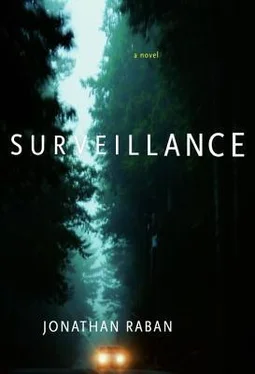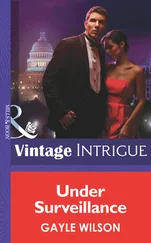He pointed to an attic window on the far right wing of the building. “My office was just behind there. A cubbyhole, really. I was a humble pen pusher on the East European desk, writing position papers for the higher-ups. But man, that was such a big thing for me. I’d just gotten citizenship, and I had a White House pass. Hey, I even got to meet the president.”
“You did?” Lucy was looking through the window beyond Augie’s desk: the incoming tide was glassing over the sand flats in the bay, the cloud over Seattle had gone, and there was a clear view southward to Mount Rainier, its snowfields mottled with chocolate patches where the glaciers were receding.
“Kissinger took me to see him. I’d been working on this project about the Sovietization of primary education in the Eastern Bloc. The Russians were putting big money into textbooks for the Czechs, the Poles, the Hungarians, and so forth, and I wrote a memo suggesting that we ought to be doing something similar, like financing textbooks for kids in France, West Germany, Italy, and England to promote the American way of life in the West. Somehow, Kissinger got ahold of my memo and called me to his office in the West Wing. He was seriously interested. Secretly, I disapproved of Henry Kissinger: I thought détente was the worst policy we could be pursuing right then. But to sit in his office, alone with the secretary of state — that was extraordinary. I was nervous as hell, of course, but I made a pretty good job of explaining my memo, and five weeks later, at three-fifteen in the afternoon, he took me to the Oval Office.
“I felt like Henry’s puppy — like I’d be whipped if I wet the carpet. The president of the United States! I’d been pulling all-nighters getting ready for this, and I’d overdosed on details. When Kissinger told me to speak, it all came out in a flood. I was telling the president about schools in Poland and Czechoslovakia, and how they were teaching history and civics there, but he wasn’t looking at me, or at Kissinger. He was gazing out in space, his face totally blank. I mean, he was elsewhere. Don’t know where. Might have been back in San Clemente…or China. I’d just gotten started on the Baltic states, and he sort of absentmindedly reaches into a drawer and pulls out a golf ball, which he rolls across his desk to me. It’s got the presidential seal on it, and his name. ‘Thank you, Mr. President.’ I’m so goofy, I go on talking. Couple minutes later, he produces a little blue leather box and pushes that across the desk. I open it, still talking, and it’s got cuff links in it. Then Kissinger gets out of his chair, and I realize the interview’s over. I never even got to mention my plan for Western Europe.”
“What on earth did Kissinger say afterward?”
“He said, ‘I’m late — I have to be in Georgetown.’ Those are the last words he ever said to me.” Laughing, Augie unwrapped the turned-back shirtsleeve on his left forearm and pulled out the cuff link. “There you are. Souvenir of my fifteen minutes with the president.”
Lucy took it from him. Nearly all the gold plating had worn to bare metal, and there was little left of the once blue enamel and presidential seal, but the stamped signature on the back, Richard Nixon, was still sharp. Quite why Augie should so treasure this token of his own humiliation was hard to figure, and she filed the question in her head for future attention.
“Nixon was a piece of work. For me, it was right place, wrong administration. I’d’ve given my right arm to work for Ronald Reagan.”
Reagan. Lucy had been a sophomore in college at Missoula when he was elected, and she had only to see his face on TV to want to chuck a brick through the screen. His horrible brown suits. The Brylcreemed hairdo that looked as if it should have gone out with giant finned fifties Pontiacs. This was the president who thought ketchup was a vegetable, that cow farts did more damage to the ozone layer than automobile emissions. She’d shuddered at his evil-empire talk, his star wars, his scary, vacant homeyness as he recited ghostwritten platitudes to the camera.
“Yeah, my liberal colleagues at the U used to look at me like that. The cultural elites of this country never did understand Reagan. But regular folks did, and so did the Poles, and the Czechs, and the people in the Gulag. They loved the man. Ask Sakharov, ask Sharansky.”
Lucy reminded herself that the business of a journalist was to be a sponge, not a sparring partner. “I’m a knee-jerk Democrat and Reagan freaked me out. I must’ve missed something, I guess.”
“He had this wonderful instinct,” Augie said. “He wasn’t an intellectual — didn’t want to debate ideas. He relied on gut feeling to tell him what to do, and somehow or other it was Reagan’s gut feelings that gave him the best grasp of the big issues of anyone then alive. He’d get it right, and right, and right again. Sure, there were stumbles: Iran- contra, I’ll give you that. But ninety-nine — okay, ninety — percent of the time, he was magic. ‘Open this gate, Mr. Gorbachev! Tear down this wall!’ He bugged the snot out of the intellectuals, but if you’d been living on the wrong side of that wall you’d have worshipped Ronald Reagan. He was funny, too. Know what he said about détente?
“‘Isn’t that what the farmer has with his turkey — until Thanksgiving Day?’ What a guy. If I had to give you one reason to respect Reagan, it’d be that he never took freedom for granted. Never. And when he saw evil in the world, he wasn’t afraid to call it out by name. But I expect you’re not much of a believer in evil, being a liberal and all.”
Lewis Olson? Lucy thought. Was Olson evil? Sick, yes. Repellent. Oozing with fatuous hypocrisy, trying to make her say the Jesus Prayer with him in jail. But she couldn’t quite bring herself to call even Lewis Olson evil. She shrugged and said, “I’m not religious.”
“Neither am I, but I know evil when I see it, and so did Ronald Reagan.”
Watching as he raised the old-timey Jeffersonian sash window by his desk, Lucy thought he was confusing things. Yes, as a child Augie had faced something for which evil was probably the only word, but when Reagan spoke of evil he was like an actor talking about bad hats in his old movies. Fact and fiction. Surely Augie, of all people, should see the difference?
He reached into his shirt pocket and produced the stub of cigarette he’d been smoking on the beach. “My afternoon gasper,” he said, with the conspiratorial wink that Lucy was coming to dislike, as if the two of them were plotting outside Minna’s ken. Perched on the window ledge, his feet barely touched the ground. He blew a plume of smoke out over Useless Bay, then ducked his head back inside.
“You make nice to me,” he said, “I’ll make nice to you.”
“What?”
“I sometimes think Americans are just too nice for this world. They assume that other people have the same inherent streak of decency they have themselves. It’s bred into the American character to appeal to the other guy’s good side — do unto others, and all that crap. But we have to deal with guys who don’t have a good side. Never did and never will. You think Stalin had a good side? Hitler? The fanatics who threaten us right now?” He took another suck on his cigarette, then immediately pinched out the burning tip and put the butt back in his pocket.
“D’you always do that? I’ve never seen anyone make a cigarette last so long.”
“I got a one-a-day habit,” Augie said. “You know what? I’ve seen people try to appease bears ? Minna and me, we used to go camping up in the North Cascades. Fantastic country.”
“I’ve done—”
“Then you know how to haul all your food up to the highest tree branch that you can sling a rope over?”
Читать дальше












